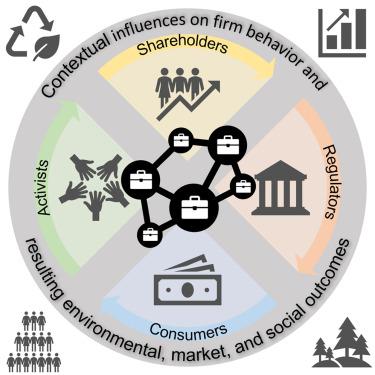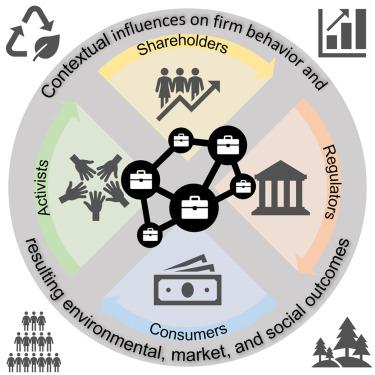股东、监管和社会对公司行为和能源市场结果的影响
IF 38.6
1区 材料科学
Q1 CHEMISTRY, PHYSICAL
引用次数: 0
摘要
能源行业正面临着来自投资者、政策制定者、消费者和活动家的压力,要求在整个价值链中减少温室气体排放,但石油和天然气公司将如何融入这一不断变化的格局是一个悬而未决的问题。尽管缺乏监管干预,但一些公司已经开始着手解决这一问题--无论是出于社会责任感、对环保活动家的恐惧、寻找新的市场机会,还是模仿同行公司的冲动。我们制定了一个能捕捉到上述各种因素的总体框架,并将其应用于建立一个基于经验的代理模型,从而深入了解美国石油和天然气行业燃烧绩效的结果分布。我们首先研究了自上而下和自下而上估算的燃烧量之间差异的可能驱动因素。然后,在预测未来情况时,我们评估了哪些市场结构和行动主义类型可以推动进一步的改善。本文章由计算机程序翻译,如有差异,请以英文原文为准。


Shareholder, regulatory, and social influence on firm behavior and energy market outcomes
The energy industry is facing pressure from investors, policymakers, consumers, and activists to reduce greenhouse gas emissions across the value chain, but how oil and gas firms will fit into this evolving landscape is an open question. Despite a paucity of regulatory interventions, some firms have begun to address the issue—whether out of a sense of social responsibility, fear of environmental activists, search for new market opportunities, or an impulse to mimic peer firms. We formulate a general framework that captures each of these factors, apply it to build an empirically grounded agent-based model, and provide insights into the distribution of outcomes in the oil and gas industry’s flaring performance in the US. We first examine possible drivers of differences between top-down and bottom-up estimates of flaring. Then, projecting future scenarios, we evaluate which market constructs and types of activism can drive further improvements.
求助全文
通过发布文献求助,成功后即可免费获取论文全文。
去求助
来源期刊

Joule
Energy-General Energy
CiteScore
53.10
自引率
2.00%
发文量
198
期刊介绍:
Joule is a sister journal to Cell that focuses on research, analysis, and ideas related to sustainable energy. It aims to address the global challenge of the need for more sustainable energy solutions. Joule is a forward-looking journal that bridges disciplines and scales of energy research. It connects researchers and analysts working on scientific, technical, economic, policy, and social challenges related to sustainable energy. The journal covers a wide range of energy research, from fundamental laboratory studies on energy conversion and storage to global-level analysis. Joule aims to highlight and amplify the implications, challenges, and opportunities of novel energy research for different groups in the field.
 求助内容:
求助内容: 应助结果提醒方式:
应助结果提醒方式:


